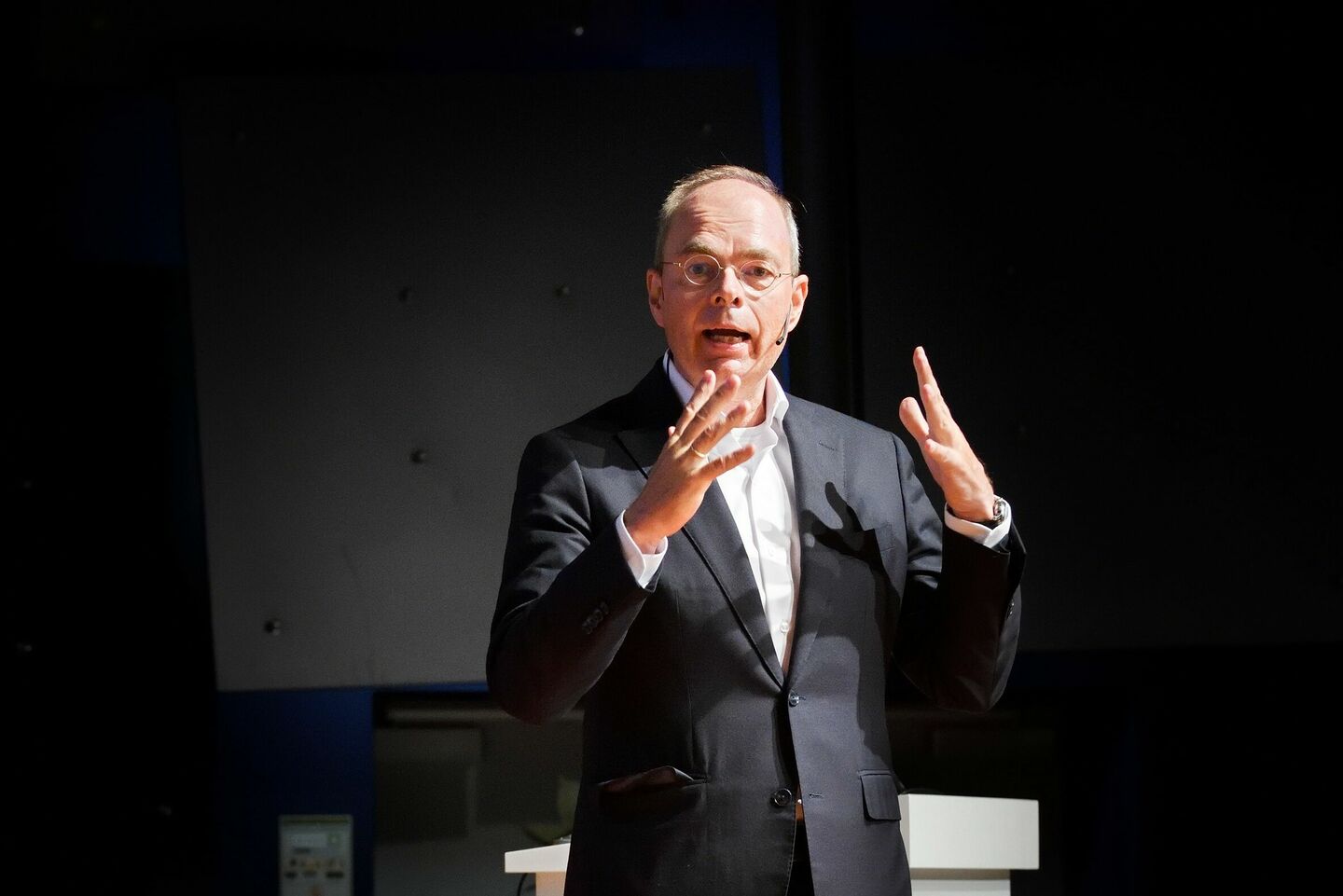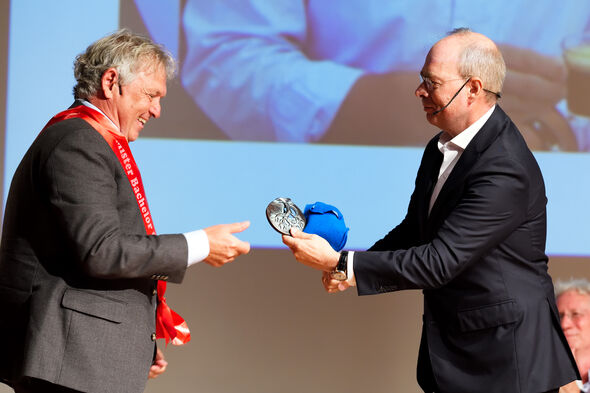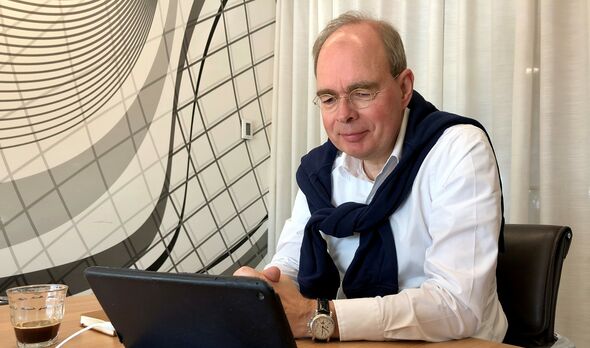
“I wouldn’t have hesitated to add another four years”
Baptiest Coopmans, chairman of the Supervisory Board, bids farewell after eight years
The eight years he served as chairman of the Supervisory Board have filled Baptiest Coopmans with pride for the Eindhoven university from which he graduated in the eighties. He was able to make a constructive contribution to many developments during those years, but he also issues a warning upon his departure. Over time, hard choices will need to be made regarding the allocation of the budget and the matter of where the university should focus its research activities on. “That will hurt sometimes,” says Coopmans, who handed the baton to ASML executive Peter Wennink on September the 1st.
“My appointment in 2012 was kind of an experiment. At 47, I was actually rather young for this position, which I could clearly deduce from the looks on the faces of the administrators and deans who saw me walk in at the time. It was considered to be more like a kind of commissionership back then, with which people concluded their careers.” Baptiest Coopmans (55) never regretted his decision. “I’ve become devoted to TU/e in those eight years, and I’m proud of all the things we’ve accomplished during that period in the field of education and research, collaboration with industry, and the development of the campus. The Supervisory Board also recruited the right people in those eight years to realize all this.”
Because that’s what Coopmans wants to make clear from the get-go: he never intended to merely monitor administrators from the sideline - to simply check whether the figures add up. “No, from the outset, all Supervisory Board members wanted to act as committed partners to the board, who actively contributed ideas and discussed all the important issues. Sometimes, we gently tried to move the board into a certain direction. But in the end, the decision-making power lies with day-to-day management, you shouldn’t want to be a co-administrator.”
Brainport region
In 2013 (article in Dutch), one year after he took up his duties, Cursor also spoke to Coopmans and asked him about his vision and expectations for the Eindhoven university. He expressed his hope that, among other things, TU/e would strengthen its position within the Brainport region. “TU/e has been extremely successful at this under Jan Mengelers, the predecessor of current Executive Board president Robert-Jan Smits. Back in 2012, the university didn’t really engage, but by now it has become an integral part of the Brainport region, and our collaboration with industry has intensified over the years. I think it’s good that it happens at an equivalent level, because there was a risk that TU/e would have elevated towards a somewhat haughty position. I also consider the establishment of something like the Eindhoven Engine by professor Maarten Steinbuch a nice example of how that collaboration has taken shape.”
The reference to Steinbuch brings Coopmans to another important point: recruiting future talented leaders and scientists. “The effects of an ageing population will also be felt at TU/e, with the retirement of an important group of people within the foreseeable future. That includes both administrators and people on the scientific staff. There’s no need for me to name names, because I think most people will know who I’m talking about. The question is: are their successors lined up and ready to take over? I believe that the university should concentrate fully on the development of talented people in their thirties at TU/e. Give these people opportunities, give them the freedom to set up initiatives themselves, and offer them perspective so that they can develop into future leaders. Because having such a group of talented people in your ranks is what determines the chances of success for any institution. The fact that the university aims to recruit talented female personnel in particular is also a good thing.”
Choices
Coopmans is most satisfied with the choices TU/e has made over the last eight years. “Look at the establishment of our Bachelor College, and the effect it had on education, on student influx and, last but not least, on the students' completion rates. Those rates were really bad before, and the ministry quite rightly asked critical questions about that. We have a much better story now in this area, and we score well during assessments. But, in all honesty, it was an opportune time for TU/e to introduce the Bachelor College. Attention to technique and exact sciences has increased significantly over the previous years.”
The establishment of the Bachelor College came with another additional advantage, Coopmans says. “It brought all those different groups at TU/e, which were mostly working for themselves in first instance, together in one area for the first time. There is a much greater sense of collectivity at TU/e now than when I started. And the university should really continue with this development, because important choices need to be made if the university truly wants to compete with domestic and foreign institutions. Institutions that act on this too late will have a very hard time in the future.”
Before the establishment of our Bachelor College the students' completion rates were really bad, and the ministry quite rightly asked critical questions about that
What kind of choices should we be thinking of? Coopmans: “In the future, the Executive Board won’t be able to equally divide its total budget any longer. Certain departments will receive less. Choices need to made with regard to research, because a medium-sized university like TU/e can’t excel in all areas. A broad level needs to be maintained, but the university should really concentrate on those areas in which we can play an important role.”
TU/e, which has shifted increasingly to a collective organization, should embrace the idea that the university as a whole is greater than the sum of the parts from which it is built, Coopmans believes. “Guiding that process will be quite a challenge for the Executive Board in the next few years, something that can’t be easily implemented. And yes, it will hurt sometimes.”
Strategy 2030
All that sounds rather threatening, but fortunately Coopmans also sees more than enough chances for his Eindhoven alma mater. “As far as education is concerned, TU/e achieved something with its Bachelor College for which there is no equivalent, certainly not in the Netherlands. And this particular educational concept is still in development, look at challenge-based learning. Training engineers is our core business after all. As an institution, you also send a clear signal with the recent launch of new institutes, such as EAISI for artificial intelligence and EIRES for renewable energy. It establishes certain research topics across all your departments. Do make sure however that it bears your own signature, and coordinate with other institutions so that you won’t all be working on the same things. That’s what we’re talking about when the topic of more collaboration between the universities of technology comes up, I believe: agree among yourselves on who will do what, and how to complement and strengthen each other in those fields.”
He is also proud of TU/e’s Strategy 2030, which was presented last year, and of the “bold” Irène Curie Fellowship program that started in July last year but has now been put temporarily on halt due to a ruling by the Netherlands Institute for Human Rights. “That’s when you see that the inferiority complex in Eindhoven is a thing of the past, and that this university isn’t afraid to take risks. The Supervisory Board was very glad to cooperate in that. We also have much expertise and experience to add.”
Campus
The TU/e campus is probably especially meaningful to him, because he used to walk around there himself as a young Industrial Engineering student between 1983 and 1988. Coopmans: “The many construction projects that needed to be carried out were practically a constant feature on the Supervisory Board’s agenda during the past eight years. Much was demolished, renovated and built during that period, and it involved huge sums of money. Our job is to make sure that the administrators don’t get carried away with their building ambitions, which sometimes happens elsewhere in higher education in the Netherlands, and to adhere to a strict housing ratio of fourteen percent. The perspective on working from home has also changed radically in these times of corona. I think that the Supervisory Board was proven right on many occasions when we warned against building more teaching rooms. After corona, things will never go back to how they were. I also see that within my organization Liberty Global. People will still come to the campus for research and to meet each other, but other activities will take place from home.”
The compactness of the Eindhoven campus is a huge advantage, he believes. “Everyone is close together, it’s perfectly in line with the growing sense of more collectivity. I also think the Green Strip (Groene Loper), where students can meet each other, is fantastic. And look at the newly constructed buildings, such as Flux and student housing complex Aurora, or the buildings that were renovated, of which Atlas is probably the most successful example. Incidentally, TU/e is still facing another large-scale renovation project: Gemini, where Mechanical Engineering and Biomedical Engineering are located. Make no mistake about the scale of that.”
Strong team
Having to say goodbye after serving as chairman for eight years is not that easy for Coopmans. “I wouldn’t have hesitated to add another four years. Now that I’ve left, I’ll refrain from all administrative matters. The new chairman, Peter Wennink, doesn’t want me to show up at every occasion. There’s a very strong team in place now with people like Coen Teulings, Mariëtte Hamer and Louise Gunning. All highly capable and experienced people, I would say. Jacob Fokkema, former rector at TU Delft and a member for six years, will leave in December.”
But of course, it’s the employees that constitute the basis for TU/e, Coopmans says. “I have much admiration for their commitment when it comes to supervising students, teaching, and conducting research. And I equally admire all the members on the auxiliary staff. That admiration has only increased during the past eight months. The future is challenging for this university, because don’t assume that the government will provide any additional funding. This also means there’s a limit to growth. That’s not a bad thing in itself. TU/e is not a university of great international stature, but it is a very strong institution within the Netherlands and Europe. And I can guarantee everyone: the grass may seem greener on the other side, but it certainly isn’t. Eindhoven is a great place to be for students and employees.”
“Someone who unites and inspires”
President of the Executive Board Robert-Jan Smits describes Baptiest Coopmans as “a fantastic supervisor, who is phenomenally committed to TU/e and its board.”
Smits says that Coopmans showed his commitment from the very first minute. “He immediately went out into the university and started to talk to people. With deans and professors. And also with the University Council, where he served as a confidential advisor for some time.”
His input and leadership during a total of forty meetings with the Supervisory Board were inspiring and of great value, Smits says. “He gave everyone space, which helped the process of bonding, and he oversaw everything from the strategic overall picture. That created a good atmosphere, both within the Supervisory Board and between the Executive Board and the Supervisory Board. Even if he had to improvise a meeting from a small hotel room in Germany, he always insisted on taking part. In 2019, when he was cycling along the Californian coast with his son, he made time available to talk to the review committee for the Institutional Audit Quality Assurance.”
Coopmans took the preparations for meetings very seriously, according to Smits. “He printed out each document, which led to such a huge paper stack that he jokingly said he needed a small trailer to carry it all. But he did read everything.”
Looking at his past, this commitment comes as no surprise, Smits says. “He was already on the list of candidates for the student council on behalf of Groep 2000 as an Industrial Engineering student in March 1985. He served as the undisputed chairman of the group for only one year, and he had already developed a clear vision on TU/e’s administration. The acting editor of TH Berichten - Cursor’s paper forerunner - quotes Coopmans as saying the following in the edition of 14 March 1986: “The THE must be governed efficiently and functionally if it wants to guarantee its competitiveness.” He also referred to the third flow of funds as an important point of focus. Those were the words of a true Brainport apostle avant la lettre.”
Smits regrets the fact that Coopmans’ farewell ceremony eventually had to take place online. “But that in no way diminishes the enormous gratitude we feel for his many years of commitment and boundless dedication.”
Career Baptiest Coopmans
At the moment Baptiest Coopmans is the CEO of UPC Switzerland. He also oversees Liberty Global’s operations in Poland and Slovakia. He joined the Liberty Group in 2013 as the CEO and Managing Director of Ziggo, then UPC Netherlands, where he led the merger of UPC and Ziggo. Prior to joining Liberty Global, he was the Managing Director and a member of the Board of Directors at KPN, from 2006 till 2011. He also had an 18-year career at Unilever.



Discussion